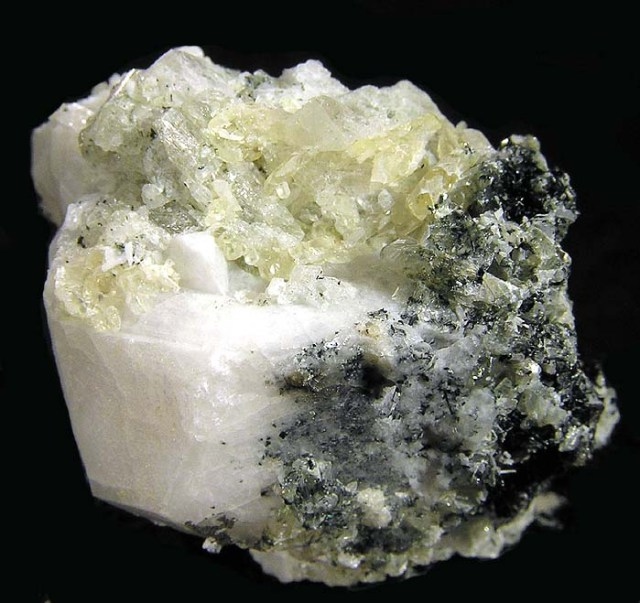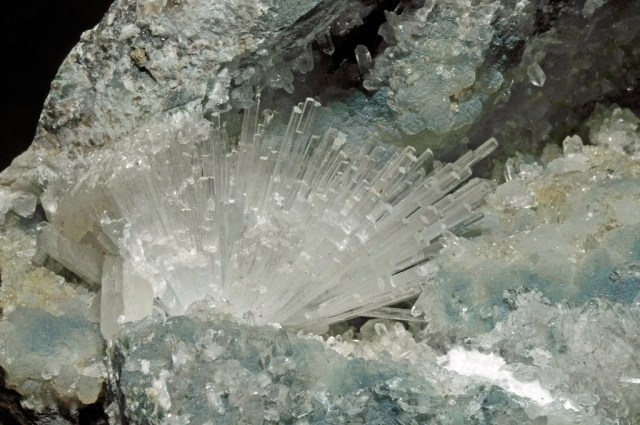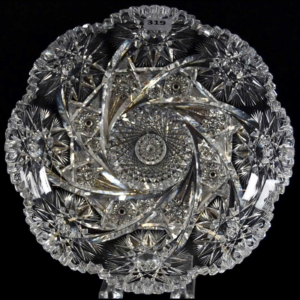Natrolite


Haineaultite-Analcime-Natrolite
Bombay Quarry, Mumbai District (Bombay District), Maharashtra, India
Natrolite is a tectosilicate mineral belong to zeolite group members.Its formula Na2Al2Si3O10 • 2H2O. A hydrated sodium aluminosilicate, natrolite takes its name from the Greek word natrium, which means “soda” a reference to the sodium content of this mineral. Natrolite can be pale pink, colorless, white, red, gray, yellow, or green. Some specimens fluoresce orange to yellow under ultraviolet light. Natrolite crystals are generally long and slender, with vertical striations and a square cross section. They may appear tetragonal and can grow up to 3 ft (1 m) in length. Natrolite is also found as radiating masses of needlelike crystals and as granular or compact masses. This mineral produces an electric charge in response to both pressure and temperature changes. Natrolite is found in cavities or fissures in basaltic rocks, volcanic ash deposits, and veins in granite, gneiss, and other rocks. It also occurs in altered syenites, aplites, and dolerites. Specimens are often associated with quartz, heulandite, apophyllite, and other zeolites.
Name: From the Latin natron, for the sodium content
Association: Zeolites, calcite, nepheline, sodalite, quartz
Cell Data: Space Group: Fdd2: a = 18.272(6) b = 18.613(6) c = 6.593(2) Z = 8
Polymorphism & Series: Dimorphous with tetranatrolite.
Mineral Group: Zeolite group.
Crystallography. Monoclinic; sphenoidal. Pseudo-orthorhombic, prismatic, often acicular. Prism zone vertically striated. Some specimens terminated by low pyramid. In some cases in cruciform twins. Usually in radiating crystal groups; also fibrous, massive, granular, or compact.
Diagnostic Features. Recognized chiefly by its radiating crystals. Distinguished from aragonite by its easy fusibility and water in the closed tube.
Contents
- Chemical Properties
- Natrolite Physical Properties
- Natrolite Optical Properties
- Occurrence
- Uses Area
- Distribution
- References
Chemical Properties
| Chemical Classification | Tectosilicate |
| Formula | Na2Al2Si3O10·2H2O |
| Common Impurities | Ca,K |
Natrolite Physical Properties
| Color | White, Colorless, Red, Yellow, Brown, Green, bluish |
| Streak | White |
| Luster | Vitreous, Pearly |
| Cleavage | Perfect on {110} |
| Diaphaneity | Transparent, Translucent |
| Mohs Hardness | 5 – 5,5 |
| Crystal System | Orthorhombic |
| Tenacity | Brittle |
| Density | 2.2 – 2.26 g/cm3 (Measured) 2.25 g/cm3 (Calculated) |
| Fracture | Irregular/Uneven |
Natrolite Optical Properties
| 2V: | Measured: 58° to 64°, Calculated: 48° to 62° |
| RI values: | nα = 1.473 – 1.483 nβ = 1.476 – 1.486 nγ = 1.485 – 1.496 |
| Twinning | On {110}, {011}, {031} |
| Optic Sign | Biaxial (+) |
| Birefringence | δ = 0.012 – 0.013 |
| Relief | Moderate |
| Dispersion: | r < v weak |
Occurrence
Natrolite is a mineral of secondary origin, found lining amygdaloidal cavities in basalt. Associated with other zeolites and calcite. Notable localities for its occurrence are Aussig and Salesel, Bohemia; Puy-de-Dome, France; Val di Fassa, Trentino, Italy. In the United States found at Bergen Hill, New Jersey. Also found in various places in Nova Scotia.
Uses Area
- Natrolite samples are of particular interest to collectors for those specialized in zeolite minerals. Among individual collectors large individual crystals are particularly desirable.
- Transparent Natrolite crystals are occasionally placed on rare gemstones for collectors.
- As zeolite, natrolite is also used in water purifiers and chemical filters.
Distribution
Many localities, even for ne crystals. From the
- HÄowenegg quarry, Hegau, Baden-WuÄrttemberg, Germany.
- At Puy de Marman, near Veyre, Puy-de-Dome, France.
- In the Dean quarry, St. Keverne, Lizard Peninsula, Cornwall, England.
- At White Head, Co. Antrim, Ireland. From the Langesundsfjord and Tvedalen areas, Norway.
- In the Khibiny and Lovozero massifs, Kola Peninsula, Russia, large crystals.
- In the USA, at Bergen Hill, Hudson Co., at Prospect Park, Passaic Co., and in the Chimney Rock quarry, Bound Brook, Passaic Co., New Jersey; from north of Livingstone, Park Co., Montana; around Springeld, Lane Co., Oregon; and at the Gem mine, San Benito Co., California, USA.
- In Canada, huge crystals from the Johnston asbestos mine, near Thetford, and from Mont Saint-Hilaire, Quebec; in the Bay of Fundy district, Nova Scotia; and along the Ice River, British Columbia.


Leave a Reply
Want to join the discussion?Feel free to contribute!